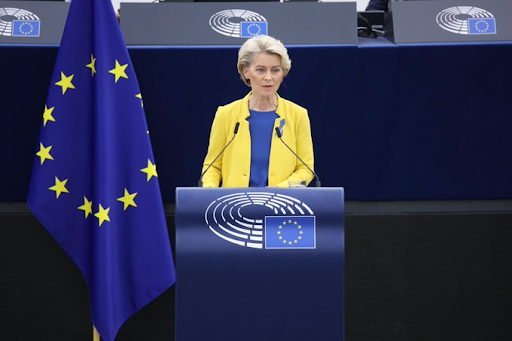It was great to see a central focus on Intergenerational Fairness in European Commission President Ursula von der Leyen’s State of the Union address last week. A statement that was accompanied by a clear commitment to action by making Intergenerational Fairness a core principle for the Union.

“Every action that our Union takes should be inspired by a simple principle. That we should do no harm to our children’s future. It is time to enshrine solidarity between generations in our Treaties.”
– Ursula von der Leyen, State of the Union Address
This is just one of a series of commitments that institutions and governments have made over the past year, building on efforts in the international community:
- Our Common Agenda, the UN Secretary-General’s report placed Intergenerational Fairness at the heart of its ambitions, outlining the need for a Declaration on Future Generations, and a United Nations Special Envoy for Future Generations.
- President of the Portuguese Republic Marcelo Rebelo de Sousa made a public statement championing Intergenerational Fairness and is incorporating the assessment framework into his scrutiny process. SOIF is training the President’s team at his request.
- Canada’s deputy Prime Minister, and Minister of Finance, Chrystia Freeland, recently said, “One of the things that I am most concerned about as someone who — it shocks me to say this — is 53 years old is the intergenerational injustice. We had a better shot at buying a home and starting a family than young people today, and we cannot have a Canada where the rising generation is shut out of the dream of home ownership.”
Easy to say, harder to do, putting intergenerational fairness into practice
It is great to see this momentum. However, more needs to be done to ensure this agenda is truly operationalised. An effort is needed to ensure that younger and future generations are truly represented in policy-making. There is a need to close the data gap–with insufficient reliable or comprehensive information on the long-term impact of most policies.
At SOIF, we have been working to ensure intergenerational fairness is integrated into practice. In our paper on Intergenerational Fairness and the European Green Deal, we set out a number of practical steps that can be taken in Europe and elsewhere to build on this momentum:
- Using intergenerational dialogues to explore, build and renew social contracts harnessing principles of fairness and participatory foresight.
- Building institutions that can both hold the focus and advocate for intergenerational fairness at all times, especially when governments and systems are distracted by crises and short-term pressures.
- Using policy assessment and other mechanisms that help inform decisions and debate and build accountability around decision-making.
- Support parliamentarians and citizens to connect into big decisions that are being made around the Recovery Plan for Europe, the EU Green Deal, COP27 and more.
- Nurturing existing networks of intergenerational fairness practitioners and advocates that exist formally and informally across the EU.
We look forward to seeing how the European Commission takes forward this agenda taking practical and tangible steps.
Ways of taking this forward
Intergenerational Fairness is the responsibility of leaders around the world to make intergenerationally fair decisions, regardless of whether they are working for a national or local government, an international organisation, a national or multinational corporation, or even a community.
If you’re looking for ideas about how to get started, our assessment framework, developed with the Calouste Gulbenkian Foundation, is a practical starting point. It was developed to help decision-makers whether any strategic, policy or investment decision is fair for the long-term, or merely responding to short-term interests. It also sets out the basis for putting participatory dialogue at the heart of the assessment process.
The framework has been used in the UK Parliament as FutureCheck, a citizen-led process to scrutinise legislation (read our collaborator APPG Future Generation’s blog) and adapted by the UK’s Social Mobility Commission.
